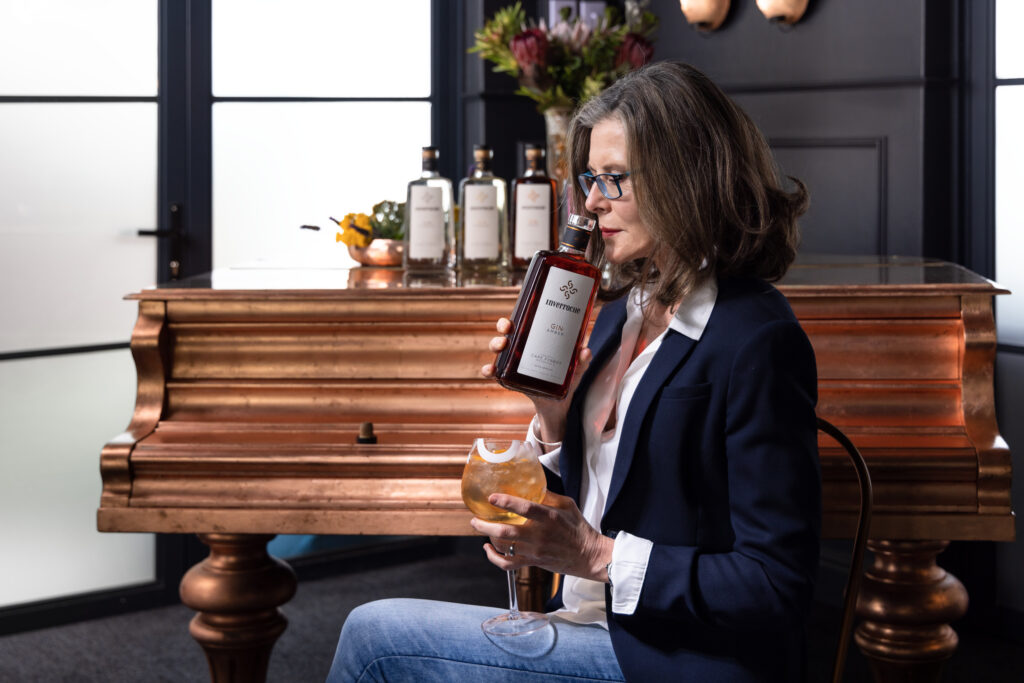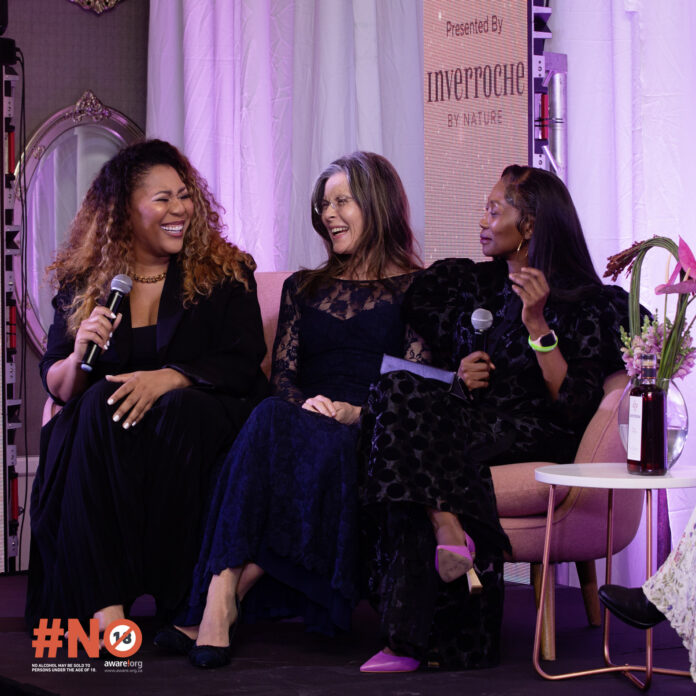Local luxury craft gin Inverroche has been making remarkably positive strides in the local and international beverage circles in over a decade. From winning awards to being distributed in over 30 countries worldwide, and now as a drink partner of choice in some of South Africa’s major showbiz gatherings, the 12 year-old gin has barely had a quieter season post Covid-19, and it’s not hard to see why.
The pioneering alcohol brand has produced what is now known as among South Africa’s first handcrafted luxury gins to successfully experiment with the Cape fyndos floral variant, with the help of its visionary founder Lorna Scott. However, it was her steadfast resolve over the years in supporting female leadership – which Scott further unpacked during our sitdown at the recently concluded inaugural AWAfrica (Advertising Week Africa) Future is Female awards – that made us and many others to stand up and take notice.
As a purpose led news media, we are always looking for inspiration especially in brands that prioritise consumers’ wellbeing by finding ways to empower them, and when we learnt that Inverroche is partnering with AWAfrica, which was subsequently followed by an exclusive invite to the awards ceremony in Johannesburg, we were truly elated. This, for us, was a perfect opportunity to find out more not only about the company’s latest conquests, but what really drives this flourishing SA gin brand.
“First and foremost, as a brand 70% of our employees are female. At the heart of what we as a brand is women and the role they play in society,” says founder Lorna Scott, adding: “As Inverroche, we’re honouring the emergence of women as creative beings, who about 150 000 years ago first discovered indigenous spices, in particular the Cape fynbos we use to infuse our gins with. Native to the Western Cape of southern tip of Africa. Found only in the Southern tip of South Africa, the Western Cape, Fynbos were used by indigenous people for medicinal and culinary purposes.That generational knowledge has been retained and passed on from generation to generation.”
But for the brand, the most important aspect, she adds, “is around the role women have played as the first species to discover nature in respect to the value of what it means to us as humans. That’s why its important for me to find any opportunity I can to bring recognition to women, who throughout the ages and their lived cultures, have been the mainstay of what we really are as modern humans. As a brand, we want to bring that into play and pay it forward in regard to what we do now: respecting nature, working with women and propelling them forward.”

Inverroche: more than a female-forward gin brand
While Inverroche has over the years become largely recognised as a pro-female brand, there’s more to it, Scott says. “When consumers look at Inverroche, I want them to remember that it’s not just about being female-foward in terms of paying homage to their resilience, but also about elegance, simplicity, and essentially embracing all those things that speak about the nature of women; it’s about care, about authenticity.” She adds: “So when people talk about us as a brand, I want them to have that instant connection to a place, its common origin, which is Africa. Yes there’s a female element, of not only survival stories, but of a place where everybody feels at home. It’s about collaboration and family.”
For local gin enthusiasts, one of the first things that comes to mind when they think of Inverroche is how it started with small steps. As one of South Africa’s first artisanal gins, the company’s courageous journey, “of how we started in the middle of nowhere (in the rural community of Still Bay in the Western Cape) with most of the people unemployed being women, to evolve to become fully circular – so that we make a difference as a brand and creates values and ethos,” are some of the things Scott takes pride in, rightfully so, and spoke at length about during our brief encounter at the event.

That Inverroche understood what building an authentic brand meant from the get-go, wasn’t something hard to grasp as we chatted, and so is their commitment to this mission. “As a brand not only do we have women as shareholders in the business. The way we do business is entirely different; everything is handcrafted…nothing is mechanised. For an example, we have 16 pairs of female hands working on a single bottle of Inverroche. So for us, as you can see it’s about walking the talk,” she says before elaborating what she meant by that. “You always hear businesses say they want to be sustainable, but it has to be tangible, and for us it’s about being true to that promise. For me, making the business circular in terms of saving the environment centres around the human element that embraces nature, which is what our entire business model revolves around. Only then things will change.
“As I said, 70% of our employees are women, and more than 60% of them are heads of households and single parents. So there’s a dynamic at play already here. It’s no longer just about putting food on the table. We create careers, we create leaders and ownership.”
So, it wouldn’t be so hard to find someone say to us, ‘look I build a house from your gin
Inverroche founder, Lorna Scott
Explaining further on what makes the business difference from the rest, she says: “It’s the way that we’re evolving our business as we find opportunities in our up and down streams. For an example, to reduce waste in our supply chain, the citrus we use in our distillation process is made from zest, and not the fruit. As we speak, we are in the process of setting up an entity with its own staff of ownership that will add value to the citrus business with a range of frozen products. And not only that; our waste water is repurposed and donated to a small local company that makes bricks. So, it wouldn’t be so hard to find someone say to us, ‘look I build a house from your gin’.
As we ponder what the next chapter would be for this ever evolving South African spirit, now distributed in more than 30 countries in four continents (Europe, America, Asia, Africa), at least we can all agree on one thing; that their success story inspire confidence in traditional homegrown South African products. As Scott best puts, theirs can be attributed to a number of exceptional traits: “First; connecting with nature in a way that you cause it to flourish. Last and most importantly; that the Southern tip of Africa in particular is home to every human alive on this planet, and that’s the real story that most people are finding it interesting with Inverroche, and our global success as a brand.
About AWAfrica Future is Female awards
The Future is Female awards form part of the Advertising Week Africa (AWAfrica), the world’s largest annual gathering of leaders in the advertising space. The awards are an inclusive set of accolades that honour African female pioneers whose stories inspire the next generation of future leaders from the continent.
Scott was one of the keynote speakers leading the session prior to the announcement of winners on the night, and was tasked with sharing her company’s vision and principles for intentionally building purpose-driven brands. American comedian Kevin Hart, who was in the country at the time to perform in Cape Town and Pretoria as part of his two-city tour to South Africa, was initially scheduled to speak and let us in on his next-generation media company’s vision, but was replaced by Thai Randolph, CEO of HartBeat.

As part of their role as the sponsor, Inverroche will be presenting the headlining winner of AWAfrica Future is Female awards, Sibu Manena, founder and chief creative officer of Duma Collective, with an all-expenses paid trip to its distillery in Stillbaai, Western Cape. The prize is valued at R30 000. (See full winners list).
“When a woman is empowered, she in turn empowers her family and larger community and this model has been proven to be effective across multiple industries,” Scott said. “For Inverroche, it is a natural fit to present the AWAfrica Future is Female awards, as we’re not only about empowering women, but by extension the communities women hail from. Several of the brand’s employees have risen through the ranks and are now in leadership roles, thanks to their tenacity and unwavering dedication.”


